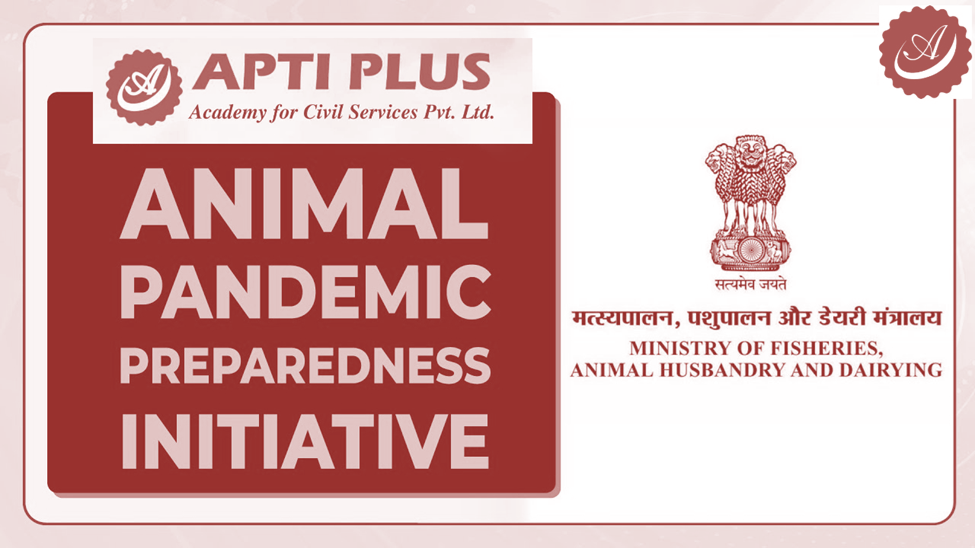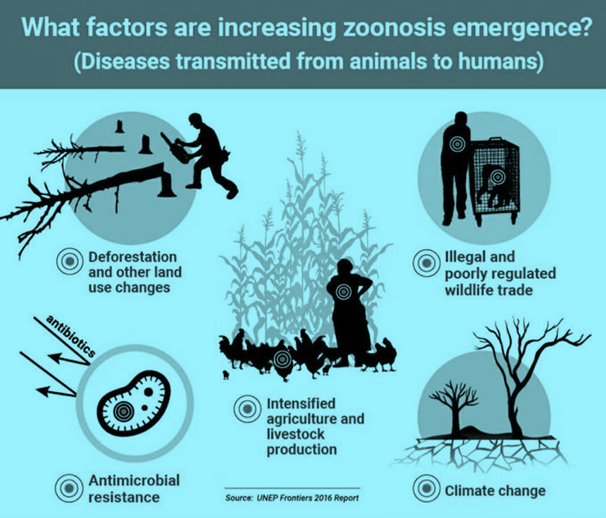Description

Copyright infringement not intended
Context: The "Animal Pandemic Preparedness Initiative (APPI)" was launched by the Union Minister of Fisheries, Animal Husbandry, and Dairying.
Details
- Under the umbrella of the National One Health Mission, the Union Minister has launched the "Animal Pandemic Preparedness Initiative (APPI)" as well as the World Bank-funded Animal Health System Support for One Health (AHSSOH) project.
Animal Health System Support for One Health (AHSSOH)
About
- The Department of Animal Husbandry and Dairying has signed an agreement with the World Bank to collaborate on the Animal Health System Support for One Health (AHSSOH).
- The joint project would be implemented as a Central sector scheme over five years with a financial provision of Rs. 1228.70 Cr.
Objectives
- The objective is to utilise the One Health method to develop an ecosystem for a better animal health management system.
- The project aims to cover 151 districts in 5 states, to increase the ability of stakeholders involved in animal health and disease management.
- Upgrading district/regional laboratories, upgrading/strengthening veterinary hospitals/dispensaries, and training para-veterinarians/diagnostic professionals and veterinary professionals.
- The community-level awareness programme on zoonotic disease prevention and pandemic preparedness.
Comprehensive approach
- The initiative seeks involvement from the Human Health, Forest, and Environment Departments at the national, regional, and local levels to create and strengthen the One Health architecture, which includes community engagement.
.jpeg)
Animal Pandemic Preparedness Initiative (APPI)
- As part of the National One Health Mission, the Department launched the "Animal Pandemic Preparedness Initiative (APPI)" to prepare for future animal pandemics and epidemics.
- The APPI is supported by the World Bank-funded Animal Health System Support for One Health (AHSSOH) project, which covers five states in India: Assam, Bihar, Madhya Pradesh, Rajasthan, and Uttar Pradesh.
Background
- The COVID-19 pandemic has highlighted the need for a coordinated and comprehensive approach to prevent and control zoonotic diseases, which are diseases that can be transmitted from animals to humans.
- Zoonotic diseases account for more than 60% of all infectious diseases in humans and 75% of new or emerging diseases.
- Some of the most devastating pandemics in history, such as influenza, rabies, plague, and Ebola, have originated from animals.
- To address this challenge, India has launched the Animal Pandemic Preparedness Initiative (APPI), a visionary and proactive initiative that aims to enhance the country's preparedness and response to potential animal pandemics, in line with the One Health approach.
- The One Health approach recognizes that the health of people, animals, and the environment are interconnected, and requires collaboration across sectors and disciplines.
Key Initiatives announced
- Identify national and state-level collaborative investigation and epidemic response teams.
- Create a comprehensive integrated disease surveillance system (based on the National Digital Livestock Mission).
- Regulatory system strengthening (e.g., Nandi online portal and field trial guidelines).
- The development of disease modelling algorithms and early warning systems.
- Disaster Mitigation Planning with the National Disaster Management Authority.
- Continue focused research and development to create vaccines, diagnostics, and treatments for priority diseases.
- Create genetic and environmental surveillance tools to increase disease detection's timeliness and sensitivity.
Objectives
- To strengthen the animal health system and infrastructure, including veterinary services, laboratories, quarantine facilities, and emergency response teams.
- To improve the surveillance and early detection of animal diseases, especially zoonotic diseases, through active and passive surveillance, risk-based sampling, rapid diagnostic tests, and data management systems.
- To enhance the capacity and awareness of animal health professionals, farmers, and other stakeholders on zoonotic diseases, biosecurity measures, animal welfare standards, and best practices for disease prevention and control.
- To promote community outreach and engagement on zoonotic diseases, animal health issues, and One Health principles, through mass media campaigns, social mobilization activities, and participatory approaches.
Way Forward
- The APPI project aims to create an ecosystem for a better animal health management system using the One Health approach. It will provide technical assistance, capacity building, infrastructure development, and innovation grants to improve animal health services and outcomes in these states.
- The APPI and the AHSSOH project are expected to have significant benefits for India's animal health sector and beyond. They will help to protect the health and welfare of animals and humans from zoonotic diseases; enhance the productivity and profitability of livestock farming; reduce the economic losses due to animal diseases; improve food safety and security; and contribute to environmental sustainability.
- The APPI and the AHSSOH project are examples of India's commitment to holistically addressing animal pandemics. By implementing the One Health approach, India can achieve its vision of a healthy and prosperous nation for all.
Keywords
Pandemic
- Pandemics are outbreaks of infectious diseases that spread across the world, affecting a large number of people.
- They have the potential to devastate human health, social and economic institutions, and global security.
- The COVID-19 pandemic, which began in late 2019 and is still affecting millions of people globally, serves as a sharp reminder of the importance of being prepared and resilient in the face of such threats.
Zoonotic diseases
- Zoonotic diseases are infectious diseases that can be transmitted from animals to humans and vice versa.
- They are caused by various types of pathogens, such as bacteria, viruses, or parasites. Examples; rabies, influenza, salmonellosis, plague and COVID-19.
- They pose serious threats to public health, animal health and food security.
- They can be prevented and controlled by adopting good hygiene practices, avoiding contact with sick animals, vaccinating animals and people, and ensuring food safety.

Must Read Articles:
One Health Approach: https://www.iasgyan.in/daily-current-affairs/one-health-approach-37
|
PRACTICE QUESTION
Q. How does the one health approach help to prevent and control zoonotic diseases and support the implementation of the Animal Pandemic Preparedness Initiative (APPI)?
|

https://www.pib.gov.in/PressReleasePage.aspx?PRID=1916077












